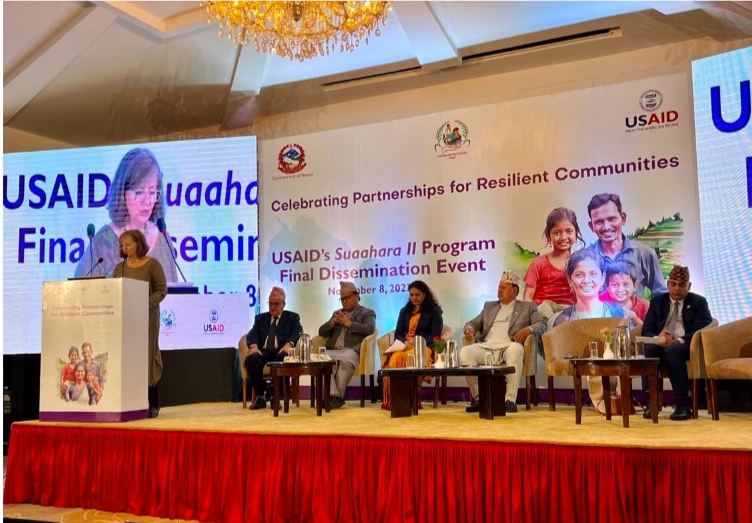
Kathmandu – USAID’s investment in nutrition through the Suaahara II “Good Nutrition” activity has resulted in the improved nutritional status of mothers and children in Nepal. Suaahara II, USAID/Nepal’s flagship, multisectoral nutrition activity, is the USAID’s largest activity in Nepal in terms of geographic coverage and budget, implemented over 7 years with a total estimated cost of $91.4 million and in 42 districts.
Through the implementation of evidence-based interventions in alignment with the Government’s national Multi Sectoral Nutrition Plan, Suaahara II has successfully reshaped dietary habits and critical nutrition practices of Nepalis. These notable achievements were shared during a program organized today to disseminate the accomplishments and insights of USAID’s flagship nutrition initiative, Suaahara, which spanned from 2011 to 2016, and its successor Suaahara ll from 2016 to 2023.
Speaking at the event, the Minister for Health and Population, Mr. Mohan Bahadur Basnet, commended USAID Suaahara’s substantial contribution to enhancing the nutrition of women and children in Nepal. “The findings corroborate the data of the recently released Nepal Demographic Health Survey. It is interesting that Suaahara also contributed to improving exclusive breastfeeding, which is decreasing in other parts of the country, and poses a new challenge to improving the nutrition of future generations.” An independent impact evaluation has shown that families in Suaahara-supported districts exhibited marked improvements in breastfeeding and complementary feeding practices compared to other districts. Children and mothers residing in Suaahara-supported districts are now consuming diverse nutritious food, and mothers are attending ante-natal care visits and consuming nutritional supplements that are key to ensuring their health and that of their babies.
These improvements in feeding and care practices have contributed to a decline in maternal underweight, which is linked with a lower risk of complications during pregnancy and birth, and an improvement in infant length with associated reduced risk of non-communicable diseases.
Dr. Sangita Kaushal Mishra, Director General of Department of Health Services, Ministry of Health and Population, commended Suaahara for leveraging existing government structures and community platforms, which have enhanced knowledge and capacity of health workers and Female Community Health Volunteers in program districts to deliver high quality nutrition services and tailored counseling to families. This synergy has strengthened the government’s health service delivery system and platforms, fortifying Nepal’s healthcare ecosystem.
Copyright © All right reserved to pahichan.com Site By: Sobij.